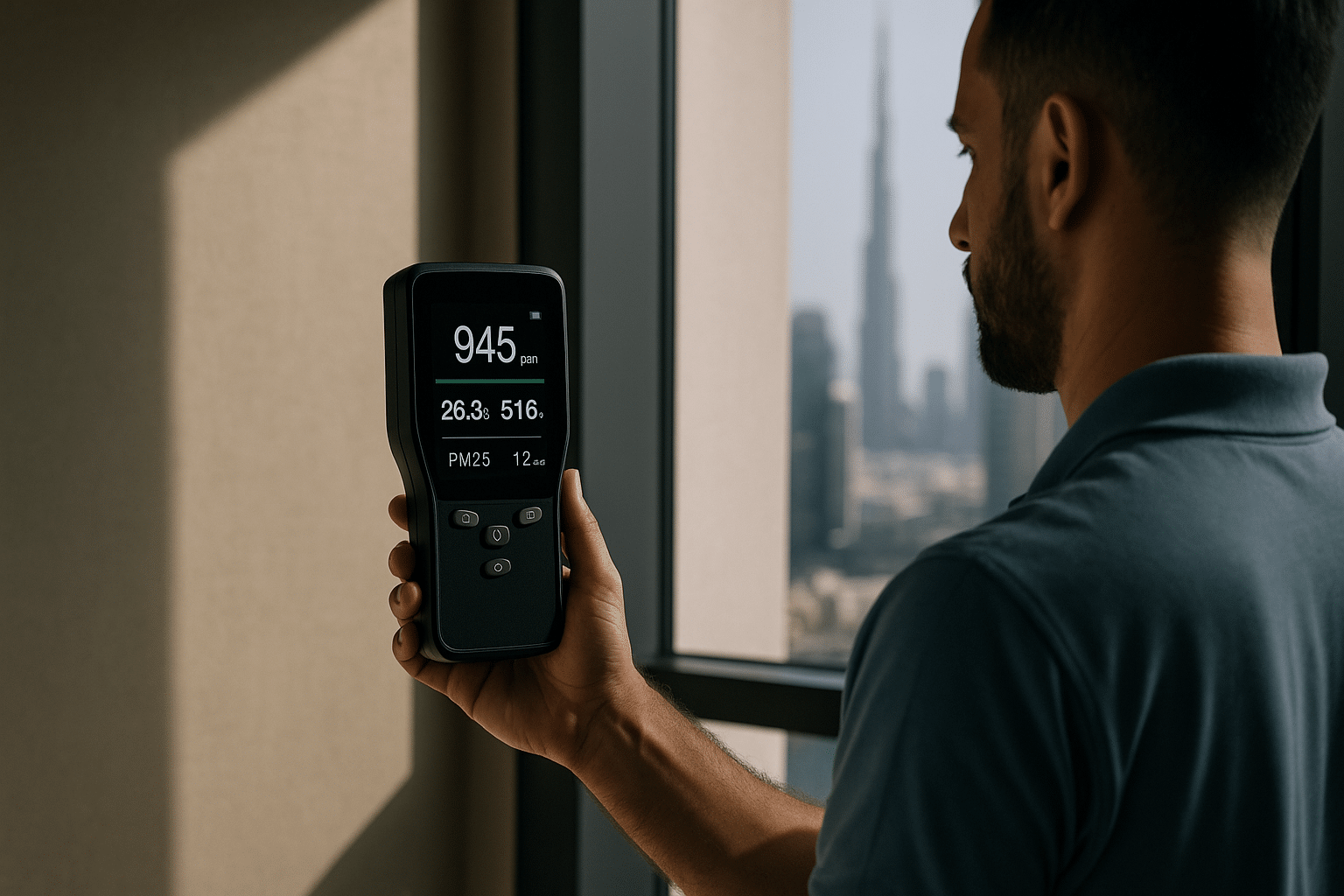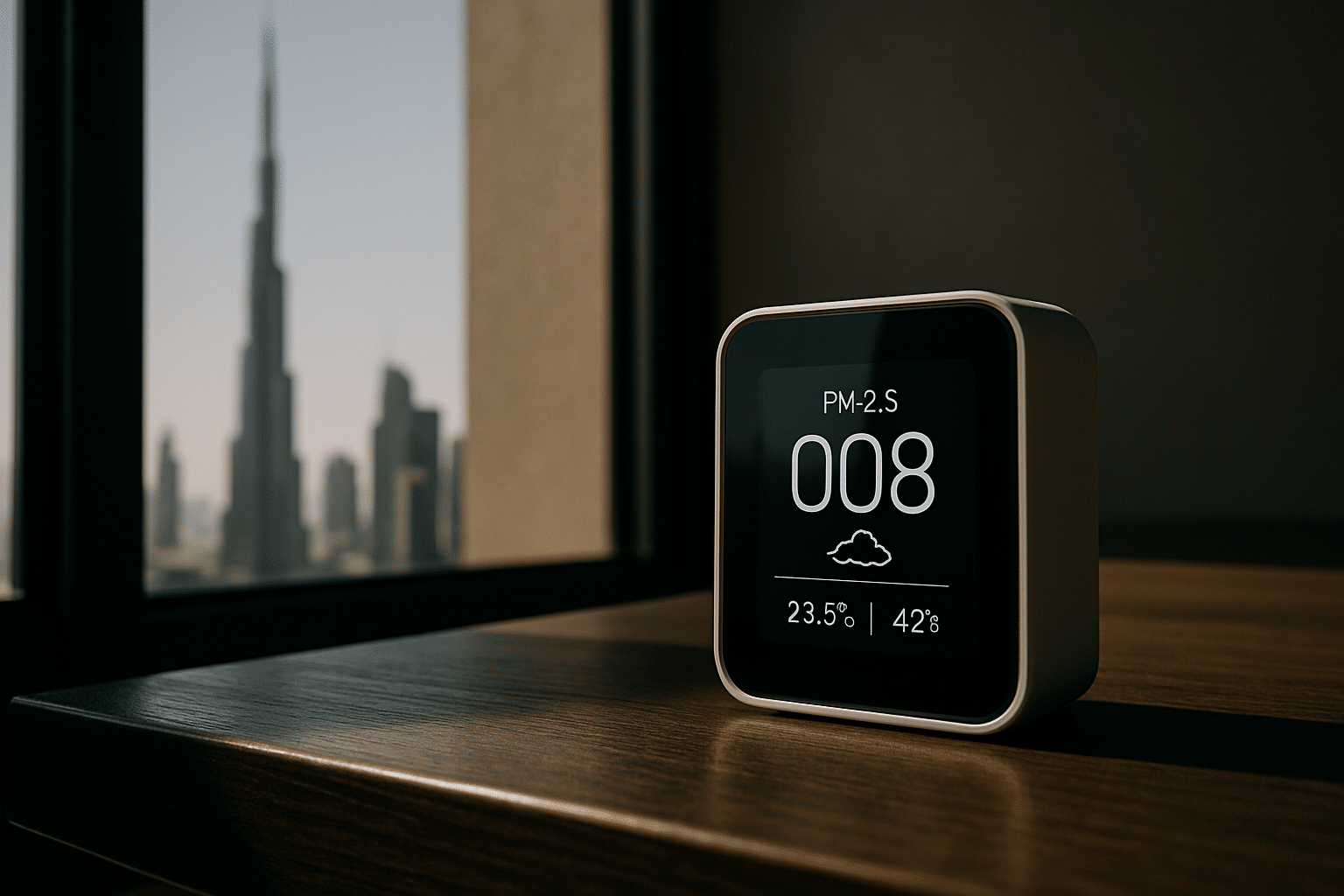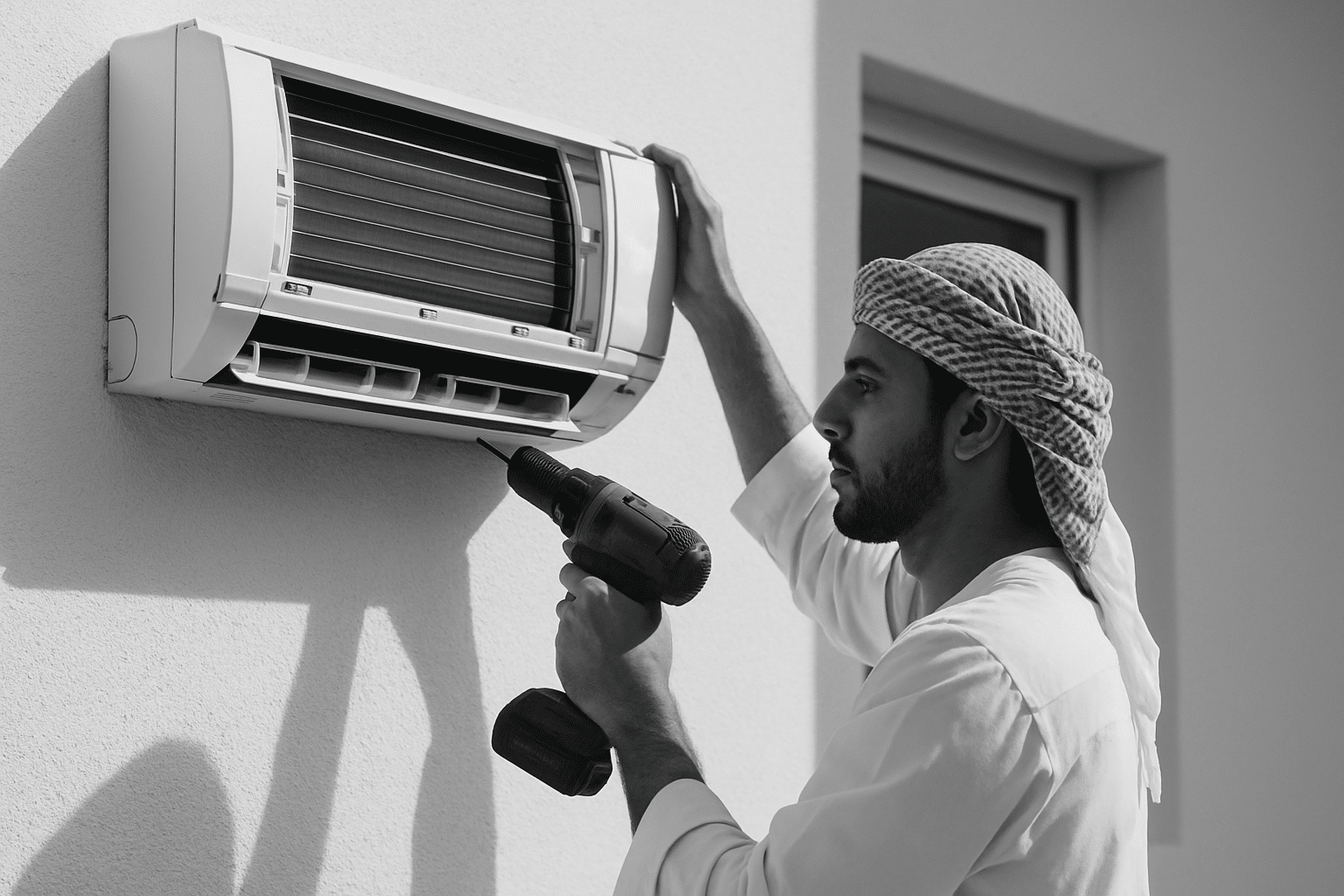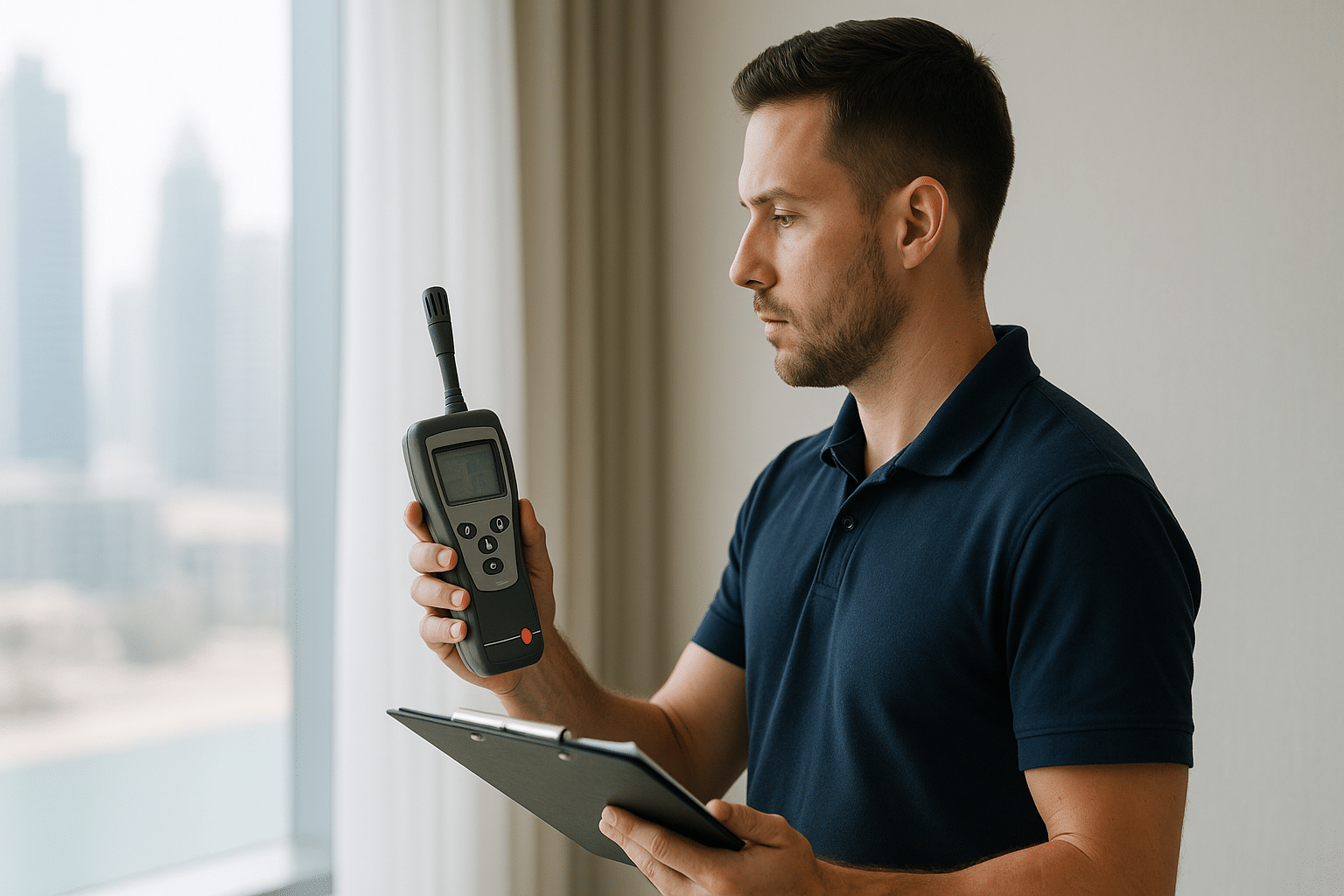
9 Practical Benefits of Indoor Air Quality Testing Dubai You Can’t Ignore
Table of Contents
Contents
- 1 Table of Contents
- 2 Importance of Indoor Air Quality Testing Dubai
- 3 Common Contaminants Impacting Indoor Air Quality
- 4 How Indoor Air Quality Testing Dubai Works
- 5 AC Maintenance and Indoor Air Quality Testing Dubai
- 6 FAQ About Indoor Air Quality Testing Dubai
- 6.1 How often should indoor air quality testing be conducted in Dubai?
- 6.2 Is indoor air quality testing covered by any Dubai regulations?
- 6.3 Can indoor air quality testing detect mold issues linked to AC units?
- 6.4 How long does the testing process usually take?
- 6.5 Are DIY indoor air quality test kits reliable enough for Dubai conditions?
- 6.6 Does indoor air quality testing help with improving AC maintenance schedules?
- 7 Choosing the Right Indoor Air Quality Testing Service in Dubai
- 8 Regulations and Standards for Indoor Air Quality in Dubai
- 9 Top Tips for Maintaining Good Indoor Air Quality
- 10 Conclusion and Call to Action
- 11 Comprehensive Insights into Indoor Air Quality Testing Dubai
- 11.1 Why Indoor Air Quality Matters in Dubai
- 11.2 Key Components of Indoor Air Quality Testing in Dubai
- 11.3 Process of Indoor Air Quality Testing Dubai
- 11.4 Benefits of Professional Indoor Air Quality Testing
- 11.5 Common Indoor Air Quality Issues in Dubai Buildings
- 11.6 Implementing Effective Indoor Air Quality Management
Importance of Indoor Air Quality Testing Dubai
Indoor air quality testing dubai is an essential service to ensure the safety, health, and comfort of residents and workers in Dubai’s diverse indoor environments. Given the city’s rapid urban growth, hot climate, and the rising use of air-conditioned spaces, maintaining clean indoor air is more critical than ever.
Polluted indoor air can lead to various health complications, reduced productivity, and accelerated deterioration of air conditioning (AC) systems. Testing indoor air quality helps pinpoint underlying problems, allowing for effective interventions.
Common Contaminants Impacting Indoor Air Quality
Understanding what pollutants commonly affect indoor air quality in Dubai is vital for timely intervention. Some of these include:
- Particulate Matter (PM): Dust and fine particles from desert surroundings and building materials.
- Volatile Organic Compounds (VOCs): Emitted from paint, adhesives, cleaning products, and furnishings.
- Biological Contaminants: Mold spores and bacteria thrive in humid or poorly ventilated spaces.
- Carbon Dioxide (CO2): Accumulates in enclosed spaces due to human respiration, causing drowsiness and reduced concentration.
- Carbon Monoxide (CO): Emitted from faulty fuel-burning appliances; highly dangerous even in small concentrations.
- Radon Gas: Naturally occurring but less common in Dubai; still a factor in specific building materials.
By identifying these pollutants, this service helps target remediation efforts effectively.
How Indoor Air Quality Testing Dubai Works
The process of air quality testing in Dubai typically involves several key steps:
- Preliminary Assessment: Professionals visit the site to assess the indoor environment, HVAC systems, and occupant concerns.
- Sampling: Air samples are collected using specialized equipment that detects particulate matter, VOCs, CO2, CO, mold, and other pollutants.
- Laboratory Analysis: Submitted samples are analyzed rigorously according to Dubai Municipality standards and relevant UAE guidelines.
- Report and Recommendations: A detailed report identifies pollutant levels, compares them against UAE regulatory limits, and suggests corrective actions.
- Follow-Up Testing: After interventions such as HVAC cleaning or ventilation upgrades, retesting ensures the issue is resolved.
This systematic approach guarantees reliable results and actionable insights for clients.
AC Maintenance and Indoor Air Quality Testing Dubai
One of the most important benefits of indoor air quality testing dubai lies in its close connection to effective AC maintenance. Dubai’s reliance on air conditioning systems to combat the hot climate means that these systems significantly influence indoor air quality.
Regular AC maintenance supported by indoor air quality testing provides several advantages:
- Improved Air Circulation: Cleaning and servicing air ducts remove dust, mold, and allergens that degrade indoor air.
- Energy Efficiency: Well-maintained AC units consume less energy, reducing operational costs and environmental impact.
- Health Benefits: Reducing pollutants lowers risks of respiratory illnesses and allergy flare-ups.
- Extended Equipment Lifespan: Proper upkeep prevents buildup that strains AC components, prolonging system durability.
Saniservice’s Dubai-based indoor air quality services combine expert AC maintenance with thorough air testing, ensuring your home or workplace stays safe and comfortable year-round.
FAQ About Indoor Air Quality Testing Dubai
How often should indoor air quality testing be conducted in Dubai?
While the frequency depends on usage and building conditions, an annual test is advisable for residential and commercial buildings in Dubai, especially considering the reliance on air conditioning and potential dust infiltration.
Is indoor air quality testing covered by any Dubai regulations?
Dubai Municipality enforces guidelines ensuring indoor environments meet safety standards. Compliance with these often requires periodic testing, especially in commercial and public buildings.
Can indoor air quality testing detect mold issues linked to AC units?
Yes, specialized tests target biological contaminants such as mold spores common in AC ducts if moisture accumulates.
How long does the testing process usually take?
Air sampling usually takes a few hours onsite. Laboratory analysis and reporting can take several days depending on testing complexity.
Are DIY indoor air quality test kits reliable enough for Dubai conditions?
DIY kits provide a rough idea but lack the precision and comprehensive scope professional testing services offer, especially within Dubai’s unique environmental context.
Does indoor air quality testing help with improving AC maintenance schedules?
Yes, test results can highlight system inefficiencies or contamination, enabling customized maintenance planning.
Choosing the Right Indoor Air Quality Testing Service in Dubai
Selecting a qualified service provider is crucial for reliable air quality assessment in Dubai. Consider these factors:
- Certification and Experience: Ensure the provider follows Dubai Municipality regulations and has proven expertise in the local market.
- Comprehensive Testing Methods: Look for multi-pollutant analysis covering chemical, particulate, and biological contaminants.
- Integrated HVAC Support: Providers offering combined AC cleaning and maintenance with testing can deliver better air quality outcomes.
- Transparent Reporting: Detailed, clear reports help you understand conditions and plan improvements effectively.
- Customer Reviews: Dubai-based reviews and testimonials indicate service reliability in the region.
Leading companies like Saniservice Dubai exemplify these qualities, providing trusted air quality testing services along with professional HVAC maintenance.
Regulations and Standards for Indoor Air Quality in Dubai
Dubai follows strict guidelines to safeguard indoor air quality, governed primarily by Dubai Municipality and aligned with UAE Ministry of Health and Prevention (MOHAP) directives. Key standards include limits on VOC emissions, particulate matter concentration, and mandatory ventilation rates.
Organizations and property managers must comply with these to maintain public safety and avoid penalties. Indoor air quality testing dubai helps properties meet these regulatory requirements by verifying pollutant levels and identifying non-compliance issues.
Additionally, industry protocols and certifications for HVAC cleaning complement Dubai’s local regulations.
Top Tips for Maintaining Good Indoor Air Quality
Beyond testing and maintenance, here are actionable steps Dubai residents and managers can take:
| Action | Benefit |
|---|---|
| Regular AC servicing | Ensures clean airflow and reduces pollutant buildup |
| Use of air purifiers with HEPA filters | Removes fine particulates and allergens |
| Minimize use of VOC-emitting materials | Reduces harmful chemical vapors indoors |
| Ensure adequate ventilation | Promotes oxygen exchange and lowers CO2 levels |
| Control indoor humidity | Prevents mold growth and dust mite proliferation |
| Promptly fix water leaks and condensation | Stops biological contamination sources |
Conclusion and Call to Action
Indoor air quality testing dubai is a smart investment for health, compliance, and operational efficiency. Understanding the benefits, regulatory landscape, and how to maintain good air reduces risks and enhances overall well-being in Dubai’s unique environment.
Don’t wait until symptoms or system failures arise. Partner with professional testing and AC maintenance providers like Saniservice to safeguard your indoor air quality—and breathe easier every day.
Comprehensive Insights into Indoor Air Quality Testing Dubai
Maintaining a healthy indoor environment in residential, commercial, and industrial spaces across Dubai has become increasingly important, especially considering the region’s unique climate challenges and urban development. This specialized testing plays a critical role in identifying harmful pollutants and safeguarding the well-being of occupants. This process involves a detailed assessment of air contaminants present within enclosed spaces to ensure compliance with local regulations and guidelines, such as those set by Dubai Municipality and the Dubai Health Authority (DHA).
Why Indoor Air Quality Matters in Dubai
Due to Dubai’s desert climate and rapid urbanization, indoor air can become compromised by various sources of pollution. High temperatures often necessitate continuous use of air conditioning systems, which, if not properly maintained, can circulate dust, allergens, and microbial contaminants. Additionally, construction activities, heavy traffic, and industrial emissions contribute to outdoor pollutants infiltrating indoor spaces, further degrading air quality.
Exposure to poor indoor air quality can lead to a range of health problems, including respiratory issues, allergies, fatigue, and exacerbation of chronic conditions such as asthma. For businesses, maintaining optimal air quality is not only a matter of health but also productivity and compliance with workplace safety standards regulated by Dubai Health & Safety authorities.
Key Components of Indoor Air Quality Testing in Dubai
Air quality assessment in Dubai commonly involves evaluating multiple factors to provide a comprehensive picture of the air environment. Essential components tested include:
- Particulate Matter (PM): Fine particles such as PM2.5 and PM10, which can penetrate deep into the lungs and cause adverse health effects.
- Volatile Organic Compounds (VOCs): These chemicals emanate from paints, cleaning agents, furniture, and plastics and may cause irritation or long-term health risks.
- Carbon Monoxide (CO) and Carbon Dioxide (CO₂): Monitoring these gases is crucial for detecting combustion-related pollution and assessing ventilation effectiveness.
- Biological Contaminants: Mold spores, bacteria, and allergens that thrive in humid or poorly ventilated environments.
- Humidity and Temperature: These parameters influence comfort levels and can impact the growth of biological contaminants.
Advanced testing equipment and techniques are employed to measure these variables accurately. Specialized sensors and air sampling equipment capable of detecting trace amounts of pollutants provide data essential for diagnosing air quality issues.
Process of Indoor Air Quality Testing Dubai
Air quality testing in Dubai typically follows a structured process to guarantee thorough analysis and precise results tailored to the unique environmental factors of local buildings. The process involves:
- Initial Assessment and Consultation: A site visit evaluates the property type, usage patterns, HVAC systems, and potential pollution sources.
- Air Sampling and Data Collection: Samples are collected over specific periods in various locations within the building to capture representative conditions. This may include peak occupancy times and periods when HVAC systems are in use.
- Laboratory Analysis: Submitted samples are analyzed rigorously according to UAE standards to detect pollutant concentrations frequently linked to health risks.
- Report Generation and Recommendations: A detailed report outlines findings and suggests corrective actions, such as improved ventilation, HVAC maintenance, or use of air purification systems compliant with Dubai’s environmental guidelines.
Organizations conducting these tests in Dubai ensure compliance with the Dubai Municipality’s environmental safety regulations and align with the UAE’s Ministry of Health and Prevention (MOHAP) standards for occupational and residential safety.
Benefits of Professional Indoor Air Quality Testing
Engaging a professional air quality testing service in Dubai brings numerous benefits, particularly given the city’s distinctive climatic and urban conditions:
- Enhanced Health and Comfort: Identifying and mitigating pollutants reduces health risks and improves occupant comfort, crucial in settings like offices in Dubai Media City or residential towers in Business Bay.
- Regulatory Compliance: Helps businesses comply with Dubai Health & Safety codes, which mandate air quality standards for workplaces and public buildings.
- Energy Efficiency: Proper assessment can optimize HVAC system operations, reducing energy waste while maintaining air quality, an important factor in Dubai’s energy-conscious building policies.
- Improved Property Value: Demonstrating healthy indoor air can increase real estate appeal in competitive markets such as Downtown Dubai or Dubai Marina.
Common Indoor Air Quality Issues in Dubai Buildings
Dubai buildings face specific indoor air quality challenges that buyers, tenants, and managers should be aware of. These include:
- Dust and Sand Infiltration: Frequent dust storms and desert winds introduce significant particulate matter indoors if windows and ventilation systems are not sealed or filtered properly.
- Mold and Moisture: Despite Dubai’s dry climate, humidity can accumulate indoors due to air conditioning condensation and poor insulation, fostering mold growth.
- Off-gassing from Building Materials: New buildings, especially in emerging communities like Dubai South, often release VOCs from paints, adhesives, and furnishings.
- Inadequate Ventilation: Many older buildings or poorly designed spaces may lack sufficient airflow, leading to elevated CO₂ levels and stale air.
Recognizing these challenges highlights the necessity of routine air quality assessments to maintain safe and pleasant environments in Dubai.
Implementing Effective Indoor Air Quality Management
Following the testing phase, taking proactive measures based on results ensures long-term air quality improvement. Recommended actions typically involve:
- Upgrading HVAC Systems: Ensuring air conditioners and ventilation equipment meet Dubai Municipality’s performance standards and receive routine maintenance prevents pollutant build-up.
- Installing Air Purifiers and Filtration: Utilizing HEPA filters and activated carbon systems can effectively reduce particulate and chemical pollutants.
- Controlling Source Emissions: Selecting low-VOC materials and controlling indoor activities like smoking and strong chemical use minimizes pollutant generation.
- Enhancing Ventilation Practices: Incorporating mechanical or natural ventilation solutions increases fresh air supply, which is crucial during Dubai’s peak summer months when windows remain closed.
Strategic indoor air quality management aligns with Dubai’s sustainability visions and supports public health initiatives driven by the Dubai Health Authority and Dubai Municipality, securing healthier urban lifestyles.
In conclusion, this specialized testing is essential for understanding and addressing the complexities of maintaining healthy indoor environments amidst Dubai’s unique urban and climatic conditions. By investing in professional testing services and following up with targeted remediation, residents and businesses across Dubai can significantly enhance indoor comfort, comply with local regulations, and promote overall well-being.






Leave a Reply